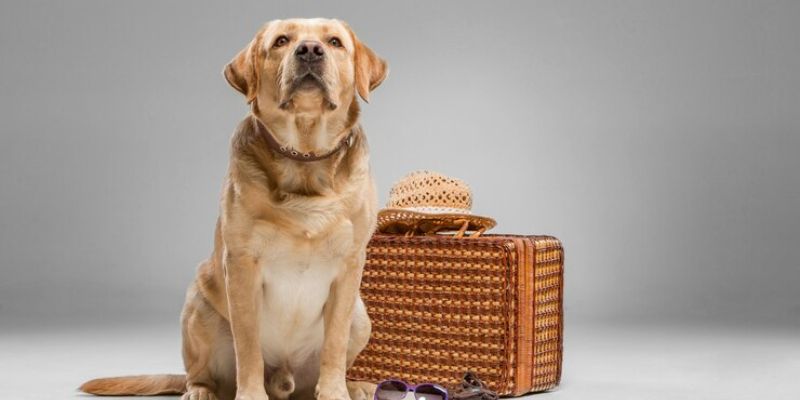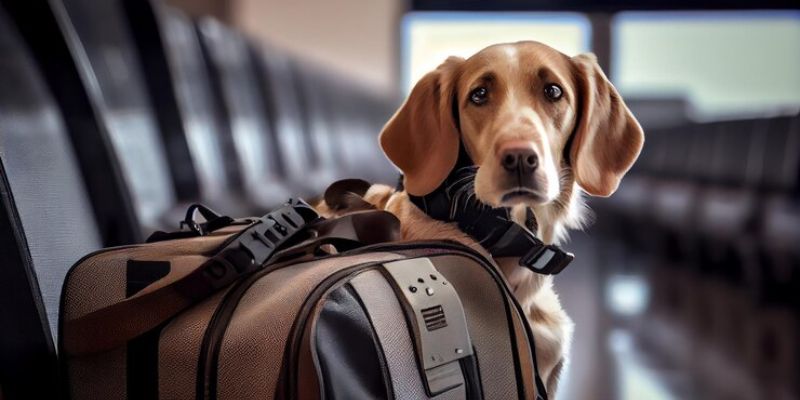Passengers can bring their pets on board with Philippine Airlines, which is one of the largest airlines globally. The Philippine Airlines Pet Policy makes it convenient for passengers and ensures that their pets can travel without any problems. This airline focuses on ensuring that pets can travel safely on their flights, as it is a frequently requested service by customers.
Table of Contents
What are Philippine Airlines Pet Policy Guidelines?
When making travel arrangements for your pet, you have to abide by the applicable rules. The guidelines may consist of fundamental safety precautions or more detailed guidelines. To ensure a seamless travel experience, it is crucial to be aware of and consider a few basic principles before making your airline reservation. This will facilitate a quicker and smoother journey for you and help keep your pet safe.
- Most flights allow passengers to bring animals such as cats, dogs, and birds for Philippine Airlines check in.
- Pets are not allowed in the cabin.
- Only trained assistance animals are allowed to ride in the cabin for free.
- Pets are allowed to travel on airplanes as cargo.
- Brachycephalic dog breeds (or their mixed-breeds) are not allowed on flights.
- Reservations must be made at least 48 hours prior to the flight in order to guarantee your pet a seat on the aircraft. This is the location where you can get in touch with or visit the office in your nation.
What are the Dimensions of Philippine Airlines Pet Carrier Requirements?
If you are using the piece idea, the Philippine airline pet carrier must have specific dimensions.
- You will be charged an excess baggage cost equal to 200% of the standard fee if the pet weighs no more than 50 lb/23 kg and the pet container is no bigger than 203 cm (80 in).
- If the pet container is larger than 203 cm (80 in) and weighs up to 99lb/45kg, you will be required to pay an additional fee that is 300% of the excess baggage fee.
- Bringing a pet on weight concept flights costs 100% of the excess baggage fee if the creature’s total weight, including the container it is in, is between 2.2 and 9 lbs.
- When flying within the Philippines, the fee for bringing a pet is $20 for every 5kg up to 20kg, and $40 for every 10kg up to 50kg.
What are Philippine Airlines Checked Baggage Rules for Pet Travel?

Pets such as dogs, cats, and birds are allowed as checked baggage on the majority of Philippine Airlines flights. The hold of the airplane has the same pressure and temperature as the passenger cabin. Philippine Airlines pet policy and Philippine check-in baggage policy comprises the following:
- Birds, dogs, and cats can be checked as luggage.
- Passengers can book pet travel up to 48 hours before their flight is set to leave.
- People who want to check their pets as luggage must be at least 12 years old.
- Passengers must have proper proof of immunization.
- Your dog might require vaccinations against parvovirus, adenovirus type 2, distemper, leptospirosis, and viral hepatitis, depending on where you are traveling.
- Depending on where you’re going, your cat may need shots against feline leukemia, panleukopenia, calicivirus, and herpes.
- When going to the Philippines, you have to get the shot between 30 and 12 months before your trip.
- You need a pass from the Philippine Bureau of Animal Industry and Animal Health Division (AHD) to enter or leave the Philippines.
- Any papers that the country of travel or goal needs.
- The pet cage needs to be impossible to get into and safe.
How much Philippine Airlines Pet Fee as Checked Baggage?
Pets on domestic flights are not eligible for the passenger’s free baggage allowance, nor are their carriers or food. The following fixed rate will apply to pet fees on Philippine Airlines Pet Policy:
Weight Limit | Fee(in USD) |
Up to 5kg | 20 |
5.1 – 10kg | 40 |
10.1kgs – 15kg | 50 |
15.1kg – 20kg | 70 |
20.1kg –30kg | 100 |
30.1kg – 40 kg | 140 |
40.1kg – 50kg | 170 |
What Documents are required for Pets to Travel on Philippine Airlines?
In order to guarantee the safety and compliance of the pet’s journey, a number of paperwork and regulations are usually needed while traveling with pets, particularly when flying. It is imperative to verify the policies of the airline and the regulations of the destination country or state, as the particular papers required may differ depending on the pet type, destination, and airline. But here are a few standard forms and specifications given by Philippine Airlines Pet Policy:
Health Certificate: Many airlines and countries require a health certificate issued by a veterinarian. This certificate confirms that the pet is in good health and fit to travel. It often includes details about vaccinations and microchip information.
Vaccination Records: Up-to-date vaccination records, particularly for core vaccinations (such as rabies), are commonly required. Some destinations may have specific vaccination requirements.
Microchip Information: Certain countries or airlines mandate that pets have a microchip for identification purposes. The microchip number should match the information on the pet’s documents.
Import/Export Permits: For international travel, some countries require import or export permits for pets. These permits ensure compliance with local regulations and may involve specific paperwork.
How to Travel with Emotional Support Dogs on Philippine Airlines?

Service animals are dogs that have received training to help people with disabilities by performing tasks or work on their behalf, according to Philippine Airlines. Support on an Emotional Level The US ACAA has reclassified dogs as pets; they are no longer regarded as service animals.
Emotional support animals are no longer eligible for complimentary passenger cabin travel on Philippine Airlines; instead, they must fly as regular pets, either as checked baggage or as air cargo.
However, here are some alternative options if you need to travel with your Emotional Support Animal on Philippine Airlines:
- Travel with your ESA as checked baggage: Dogs and cats may be checked as cargo in the cargo hold with PAL, subject to the Philippine Airlines pet policy. This alternative necessitates utilizing a suitable travel crate, paying applicable freight costs, and acquiring a health certificate from a veterinarian. But bear in mind that cargo transit can be traumatic for animals, so before selecting this option, speak with your veterinarian and take your ESA’s temperament and anxiety level into serious consideration.
- Trained service animals may fly free of charge in the cabin with the passenger.
- Verify the specific policies of Philippine Airlines regarding emotional support animals. This includes information on the size and breed of animals allowed, any additional fees, and the required documentation.
Philippine Airlines offers a fantastic chance for you and your pet to make treasured moments while traveling. The Philippine Airlines pet policy should be understood and adhered to in order to guarantee a hassle-free and joyful travel experience for you and your pet.
Frequently Asked Questions-FAQ's
Yes, Philippine Airlines allows passengers to bring pets on board their flights, following clear rules and regulations to ensure safe and convenient travel for both passengers and their pets.
Most flights permit cats, dogs, and birds to be checked in as luggage. Trained assistance animals are allowed to ride in the cabin for free. Specific regulations apply to other animals like rabbits, hamsters, snakes, and more.
To secure a seat for your pet on the plane, make a reservation at least 48 hours before your flight departure. You can contact the airline or visit their office in your country for this purpose.
The pet carrier must meet specific dimensions set by the airline. Excess baggage fees apply based on carrier size and pet weight. Additional fees are imposed for larger carriers and heavier pets.
Yes, if your pet is too big to fit in the cabin or as checked baggage, it must be shipped as cargo. Different requirements, including health certificates and proper documentation, apply when transporting pets as cargo.
Other Policies
- VivaAerobus Pet Policy
- Sun Country Pet Policy
- LATAM Pet Policy
- Swoop Pet Policy
- Pegasus Airlines Pet Policy
- Avelo Pet Policy
- TAP Portugal Pet Policy
- Scoot Airlines Pet Policy
- Swiss Airlines Pet Policy
- JetBlue Pet Policy
- Delta Pet Policy
- Southwest Airlines Pet Policy
- United Airlines Pet Policy
- LOT Polish Airlines Pet Policy
- Ethiopian Airlines Pet Policy
